Reply To:
Name - Reply Comment
Last Updated : 2024-04-25 18:20:00
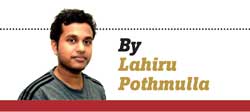 The book titled ‘Unitary State of Sri Lanka and the 13th Amendment’ was launched at Sri Sambuddhatwa Jayanthi Mandiraya in Colombo last Monday. The book is a compilation of the 13th Amendment and various court rulings given on it. It was compiled by Desarasa Lanka Foundation.
The book titled ‘Unitary State of Sri Lanka and the 13th Amendment’ was launched at Sri Sambuddhatwa Jayanthi Mandiraya in Colombo last Monday. The book is a compilation of the 13th Amendment and various court rulings given on it. It was compiled by Desarasa Lanka Foundation.
The launch was attended by a number of distinguished persons including Ven. Elle Gunawansa Thera, MP Dinesh Gunawardena, Prof. Nalin de Silva, Manohara de Silva PC and Attorney Canishka Vitharana.
They criticised the attempts of the government to introduce a new constitution which they stated was detrimental to the country. They said constitutional reforms were not a requirement of Sri Lankans but of foreign elements.
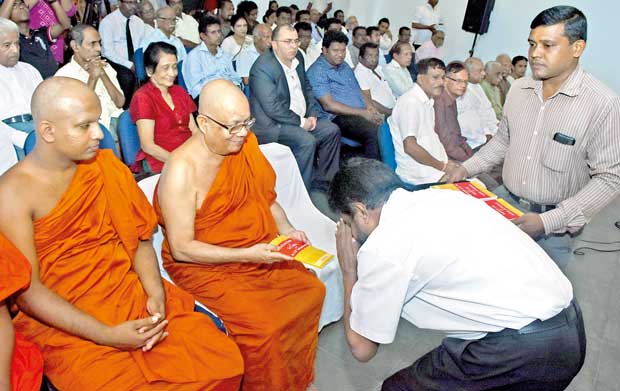 Pix by Kushan Pathiraja
Pix by Kushan Pathiraja
India demanded 13A: MP Dinesh Gunawardena
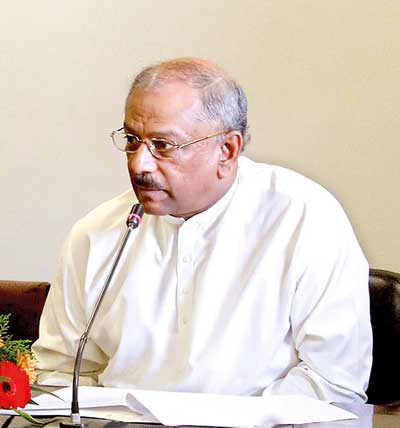
The 1987 constitutional reforms and SC ruling have been included in this book. Not many people know these facts. International and domestic forces continued to influence successive governments to divide the country. When S.J.V. Chelvanayakam formed the Federal Party (Illankai Tamil Arasu Kachchi), the US Ambassador extended his country’s greetings and said they were keen on helping Chelvanayakam. The 13th Amendment to the Constitution was a demand of India. India is a subcontinent whereas we are a small country. From the 13A, India has granted us some powers more than what were given to its states just because we are a weak and lenient country. This status has not been changed even today. Our government co-sponsored to bring in a UN resolution which includes proposals to amend the constitution and take action against war heroes. Through the resolution, we have accepted that the war victory was wrong and soldiers could be produced in a war crimes court. Meanwhile, a war crimes petition was brought in against Ambassador Jagath Jayasuriya for giving orders to end the war. Supporting the UN resolution was a grave betrayal.
We will not allow the government to change the unitary character of Sri Lanka.
When the 13A was tabled, MP Mahinda Yapa Abeywardena voted against it, thereby becoming one of the only two Government MPs to not extend their support. This is a good example as to how MPs can vote in parliament against detrimental Bills. We will not allow the government to change the unitary character of Sri Lanka.
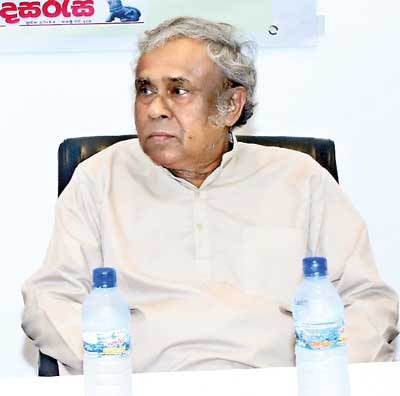 No definite interpretation has been given on what Ekiya and Federal are. This book is a guide compiling all court rulings. This should be immediately translated into Sinhala because we will soon become a confederation. In 1987, four SC judges said the 13A did not consist of Federal features. Four others said the unitary character and the people’s sovereign rights would be lost if the said Amendment was effective. However, Judge Palinda Ranasinghe established that according to articles 154 G 2 and 3, a referendum was required to enact the 13A. Ultimately, five out of nine judges underscored the need for a referendum.
No definite interpretation has been given on what Ekiya and Federal are. This book is a guide compiling all court rulings. This should be immediately translated into Sinhala because we will soon become a confederation. In 1987, four SC judges said the 13A did not consist of Federal features. Four others said the unitary character and the people’s sovereign rights would be lost if the said Amendment was effective. However, Judge Palinda Ranasinghe established that according to articles 154 G 2 and 3, a referendum was required to enact the 13A. Ultimately, five out of nine judges underscored the need for a referendum.
Yet, late President J.R. Jayewardene overlooked the ruling. So, is 13A really legal? Though I am not a lawyer by profession, I do believe that it is illegal. Hence, what we have today is an illegally-amended constitution. I do not think we could go to court over this issue in this backdrop.
On the other hand, the 20th Amendment to the Constitution is to be brought in to postpone PC polls. One PC said it was against this and that the parliament needed a two-thirds majority to proceed. The parliament does not have full constitutional powers. Is this a feature of a unitary structure? Legal experts might have said many things about the interpretation of the word ‘unitary.’
If the Northern and Eastern provinces do something against my mandate, don’t I have a right to comment on it? My sovereign right is not limited to the Western Province. As far as I am aware, sovereign rights apply to the entire country
We are in the habit of reiterating what a foreigner has said. Western countries do not know what unitary is. Can we not come up with our own interpretation? Westerners may not accept our interpretation, but at least we can. I say unitary is having only one entity for the constitutional, judicial and executive sectors. Only one parliament to make legislation.
If the Northern and Eastern provinces do something against my mandate, don’t I have a right to comment on it? My sovereign right is not limited to the Western Province. As far as I am aware, sovereign rights apply to the entire country. The 13A was imposed by Indians. Even today, the government is doing what India wants. To some extent, we have become a colony of India and the Western countries. The US and UK strive to devise a constitution for Sri Lanka. Lal Wijenayake did nothing constructive. He cannot draft constitutions. He is simply attempting to give us a constitution drafted by India and the Western countries.
Neither President Maithripala Sirisena nor Prime Minister Ranil Wickremesinghe knows how a government functions. The President is updated about developments after they appear in newspapers. Elections will be postponed indefinitely.
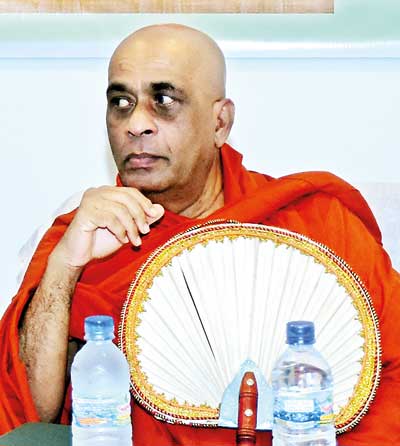 I never wanted to enter politics, but decided to do so when a need arose. I feel this was the last chance. I wonder what rights people of this country have today. Do we even have the rights of a citizen? The only right we have is the ‘6-feet’ right when we go to the cemetery. I believe that a new constitution has already been made. The government now knows who will rise against these constitutional reforms. That was why they brought Bhikkhu Kathikawatha; to silence us. Due to strong objections, the Kathikawatha was put on hold. Afterwards, an Act on racism and extremism was brought following constitutional reforms. When people started objecting these reforms, measures were taken to weaken the Sangha’s power by defamation. This robe had given shade and protection to the people. As long as the Arahat Dhajaya (Robe) prevails, no one will be allowed to harm the country. This is a country offered to the Sangha. Today, the government has appointed people to tell the Sangha how to preach and behave. These people have never set their foot to a temple. Who are they to insult us? The government even attempted to keep its hands on the tills of the temples. Even Prabhakaran said they could not achieve anything as long as there were yellow robe bearers. Government henchmen preach ‘Baila Bana’ to us today.
I never wanted to enter politics, but decided to do so when a need arose. I feel this was the last chance. I wonder what rights people of this country have today. Do we even have the rights of a citizen? The only right we have is the ‘6-feet’ right when we go to the cemetery. I believe that a new constitution has already been made. The government now knows who will rise against these constitutional reforms. That was why they brought Bhikkhu Kathikawatha; to silence us. Due to strong objections, the Kathikawatha was put on hold. Afterwards, an Act on racism and extremism was brought following constitutional reforms. When people started objecting these reforms, measures were taken to weaken the Sangha’s power by defamation. This robe had given shade and protection to the people. As long as the Arahat Dhajaya (Robe) prevails, no one will be allowed to harm the country. This is a country offered to the Sangha. Today, the government has appointed people to tell the Sangha how to preach and behave. These people have never set their foot to a temple. Who are they to insult us? The government even attempted to keep its hands on the tills of the temples. Even Prabhakaran said they could not achieve anything as long as there were yellow robe bearers. Government henchmen preach ‘Baila Bana’ to us today.
We should behave as the owners of the country, not as boarders. We have a deed which is 2,500 years old and it was renewed with the sacrifices made by 25,000–30,000 war heroes.
The Sri Lanka Freedom Party (SLFP) was made by the Pancha Maha Balavegaya. This is a party which respected the robe. If you are an SLFPer, you should stand against constitutional reforms like MP Mahinda Yapa Abeywardena. It doesn’t matter whether you belong to the Maithripala faction or Mahinda faction. They are both from the same house and should stand in unison.
When 13A was brought in, resignations were obtained from MPs. They were taken hostage in hotels and dragged to parliament by force. As other speakers said, this is illegal.
If you vote in favour, you may not be welcomed at your constituent. An international conspiracy is brewing in the country to divide it. Let us unite against this conspiracy regardless of our
party differences.
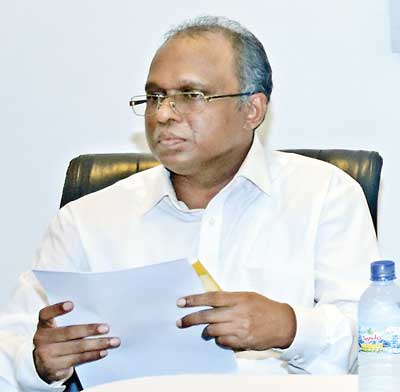 A common feature of the present and past Sri Lanka is international influence. With international backing, the LTTE tried to divide the country by taking arms against the government. The government became a victim and weak in front of these international forces. Then and now, people give no mandate to the government to go for constitutional changes. The 13A was introduced amid severe objections of the people. Even today, constitutional reforms are being introduced without a mandate.
A common feature of the present and past Sri Lanka is international influence. With international backing, the LTTE tried to divide the country by taking arms against the government. The government became a victim and weak in front of these international forces. Then and now, people give no mandate to the government to go for constitutional changes. The 13A was introduced amid severe objections of the people. Even today, constitutional reforms are being introduced without a mandate.
In the past, there was no legal precedent on the structure of the State. People took to the streets. But today, we have a legal example to follow as far as constitutional reforms are concerned. Our senior judges, after listening to arguments, gave a 5-4 divided ruling in the past. This reflects our Federal-like state structure within a unitary framework. I believe the 13A has taken us to the edge of Federalism.
After the LTTE was banned, a lawyer appealed to the European Union to remove the ban imposed on it for collecting funds. The lawyer said the LTTE focused on achieving its objectives solely by political means henceforth. Though the terrorist organisation was defeated in 2009, its objective remained unchanged. The military war defeated by arms has changed its face today and taken a constitutional facade. We can defeat this war by using knowledge. One weapon in this war is this book.
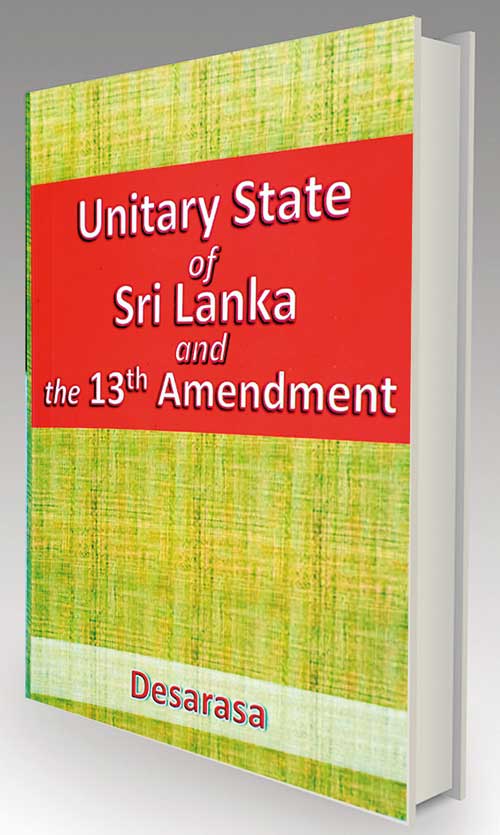
Today, there is no proper mechanism to directly gather the people’s opinions when drafting a constitution. At least 70 per cent of the population knows not of a process of devising a new constitution. Only 2,500 people had submitted direct information, and the number could increase to around 4,500 with all faxes and emails received. This is not only illegal but is also a failure. A constitution cannot be made for the entire country in this manner. From the six subcommittees appointed to steer the process of constitutional reforms, the one on Centre-Periphery Relations Report mentions about the structure of the State.
This subcommittee, without comparatively evaluating the features of ‘Unitary’ and ‘Federal’ systems, surmises that the unitary state is a failure. This is biased towards the
Federal structure.
The committee report suggests that maximum power be given to the periphery and the centre should be left with least authority.
This suggestion has been based on the principle of ‘Subsidiarity,’ meaning whatever the lowest level of governing institution can handle should be left with that body and the rest should go to the next tier and so forth.
At least 70 per cent of the population knows not of a process of devising a new constitution. Only 2,500 people had submitted direct information, and the number could increase to around 4,500 with all faxes and emails received
The new constitution is being drafted to introduce that kind of a constitution.
We should observe whether the government successfully faces international influence in reforming the constitution or bows down to these forces. This book will be helpful when countering attempts made to introduce a constitution sans a given mandate.
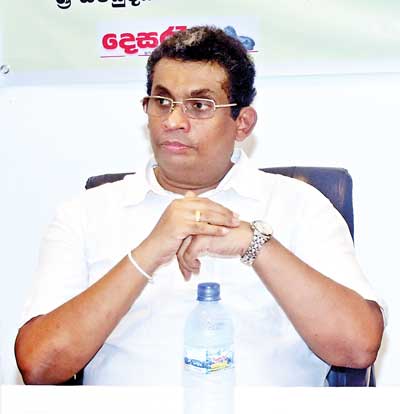 The proposed constitution will be revealed immediately after an interim report from the Constitutional Steering Committee is prepared. In the present constitution, Article 2 says Sri Lanka is a Unitary State (Ekiya). The word ‘Unitary’ has been accepted by all legal experts worldwide as having one meaning and one interpretation. Today, there is a strong opposition to change Sri Lanka’s unitary structure to Federal. If the government holds a referendum, it knows the people and the Sangha would not allow it. Therefore, the government decided to remove Unitary in the English version of the proposed constitution and termed it ‘Ekiya’ similar to the Sinhala version. This is a ploy to alter the interpretation of the word ‘Ekiya’ by deviating from international laws.
The proposed constitution will be revealed immediately after an interim report from the Constitutional Steering Committee is prepared. In the present constitution, Article 2 says Sri Lanka is a Unitary State (Ekiya). The word ‘Unitary’ has been accepted by all legal experts worldwide as having one meaning and one interpretation. Today, there is a strong opposition to change Sri Lanka’s unitary structure to Federal. If the government holds a referendum, it knows the people and the Sangha would not allow it. Therefore, the government decided to remove Unitary in the English version of the proposed constitution and termed it ‘Ekiya’ similar to the Sinhala version. This is a ploy to alter the interpretation of the word ‘Ekiya’ by deviating from international laws.
If there were a future court case over the term ‘Ekiya,’ the government can always say, “Nay! Ekiya does not have the same interpretation as the universally-accepted term unitary.”
In the proposed constitution, Ekiya has been termed as ‘undivided.’ However, not divided doesn’t necessarily mean it is not Federal. Federal ruling too is a State structure that does not divide a country. A country with Federal ruling is a country with several governments. A unitary state has only one Constitution whereas a Federal country has many. If the unitary character of the State were to continue, the centre should hold police powers. We lost this authority because of the 13A in 1987. Allowing police powers to PCs will result in different policies governed by different Chief Ministers (CMs). The Yahapalanaya readily criticised the powers vested with the president and therefore appointed various commissions including the Police and Elections Commission by reducing executive powers. However, the irony is that no one finds a CM appointing a Police Chief as wrong.
If something happened to one of us in Anuradhapura or Jaffna, it is a Police Chief appointed by the CM who investigates the incident. No former President entertained police officers to practise this because they knew the country would be destroyed if they did so. We doubt if the current leadership would do the same.
PCs can implement laws. However, this has not been practised because of the presence of the Governor -- the provincial representative of the president. Therefore, PCs want to get all obstacles in their way to fully implement the 13A. This could be done by the new constitution. We should equally oppose the 13A’s land and police powers and the proposed constitution.
The government says the Enforced Disappearance Bill, once effective, will have no retrospective effect. This too is a lie. We speak of our soldiers. If the CM of the North or East makes a tribunal or similar mechanism, everyone including the soldiers in the province will be subjected to that tribunal.
We should unite to save the unitary character of the country. The proposed constitution should be rejected. We should ask the MPs not to allow the full implementation of the 13A or enactment of the new constitution. We should tell them that if they vote for these detrimental legislatures, we would not vote for them anymore.
This book is a timely requirement in the crusade against the 13A and the new constitution to make the people aware of the impending danger.
Anuradha Saturday, 23 September 2017 08:58 PM
I am really perturbed by the silence.

Add comment
Comments will be edited (grammar, spelling and slang) and authorized at the discretion of Daily Mirror online. The website also has the right not to publish selected comments.
Reply To:
Name - Reply Comment
US authorities are currently reviewing the manifest of every cargo aboard MV
On March 26, a couple arriving from Thailand was arrested with 88 live animal
According to villagers from Naula-Moragolla out of 105 families 80 can afford
Is the situation in Sri Lanka so grim that locals harbour hope that they coul